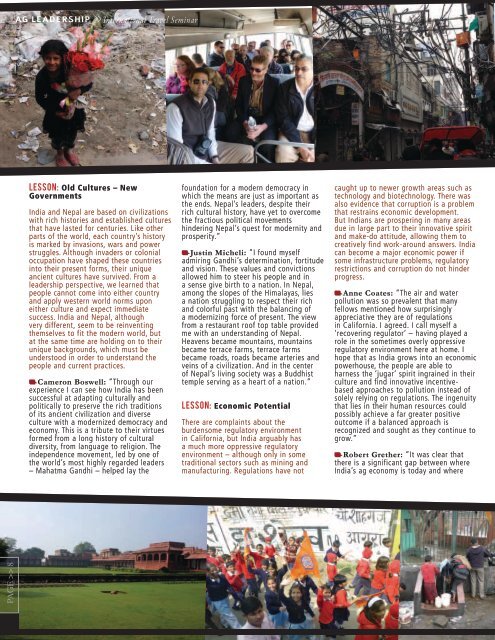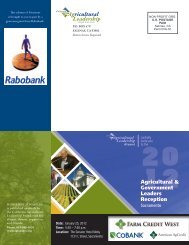hori zons
Champions of Ag Leadership - California Agricultural Leadership ...
Champions of Ag Leadership - California Agricultural Leadership ...
- No tags were found...
You also want an ePaper? Increase the reach of your titles
YUMPU automatically turns print PDFs into web optimized ePapers that Google loves.
AG LEADERSHIP >> International Travel Seminar<br />
Lesson: Old Cultures – New<br />
Governments<br />
India and Nepal are based on civilizations<br />
with rich histories and established cultures<br />
that have lasted for centuries. Like other<br />
parts of the world, each country’s history<br />
is marked by invasions, wars and power<br />
struggles. Although invaders or colonial<br />
occupation have shaped these countries<br />
into their present forms, their unique<br />
ancient cultures have survived. From a<br />
leadership perspective, we learned that<br />
people cannot come into either country<br />
and apply western world norms upon<br />
either culture and expect immediate<br />
success. India and Nepal, although<br />
very different, seem to be reinventing<br />
themselves to fit the modern world, but<br />
at the same time are holding on to their<br />
unique backgrounds, which must be<br />
understood in order to understand the<br />
people and current practices.<br />
Cameron Boswell: “Through our<br />
experience I can see how India has been<br />
successful at adapting culturally and<br />
politically to preserve the rich traditions<br />
of its ancient civilization and diverse<br />
culture with a modernized democracy and<br />
economy. This is a tribute to their virtues<br />
formed from a long history of cultural<br />
diversity, from language to religion. The<br />
independence movement, led by one of<br />
the world’s most highly regarded leaders<br />
– Mahatma Gandhi – helped lay the<br />
foundation for a modern democracy in<br />
which the means are just as important as<br />
the ends. Nepal’s leaders, despite their<br />
rich cultural history, have yet to overcome<br />
the fractious political movements<br />
hindering Nepal’s quest for modernity and<br />
prosperity.”<br />
Justin Micheli: “I found myself<br />
admiring Gandhi’s determination, fortitude<br />
and vision. These values and convictions<br />
allowed him to steer his people and in<br />
a sense give birth to a nation. In Nepal,<br />
among the slopes of the Himalayas, lies<br />
a nation struggling to respect their rich<br />
and colorful past with the balancing of<br />
a modernizing force of present. The view<br />
from a restaurant roof top table provided<br />
me with an understanding of Nepal.<br />
Heavens became mountains, mountains<br />
became terrace farms, terrace farms<br />
became roads, roads became arteries and<br />
veins of a civilization. And in the center<br />
of Nepal’s living society was a Buddhist<br />
temple serving as a heart of a nation.”<br />
Lesson: Economic Potential<br />
There are complaints about the<br />
burdensome regulatory environment<br />
in California, but India arguably has<br />
a much more oppressive regulatory<br />
environment – although only in some<br />
traditional sectors such as mining and<br />
manufacturing. Regulations have not<br />
caught up to newer growth areas such as<br />
technology and biotechnology. There was<br />
also evidence that corruption is a problem<br />
that restrains economic development.<br />
But Indians are prospering in many areas<br />
due in large part to their innovative spirit<br />
and make-do attitude, allowing them to<br />
creatively find work-around answers. India<br />
can become a major economic power if<br />
some infrastructure problems, regulatory<br />
restrictions and corruption do not hinder<br />
progress.<br />
Anne Coates: “The air and water<br />
pollution was so prevalent that many<br />
fellows mentioned how surprisingly<br />
appreciative they are of regulations<br />
in California. I agreed. I call myself a<br />
‘recovering regulator’ – having played a<br />
role in the sometimes overly oppressive<br />
regulatory environment here at home. I<br />
hope that as India grows into an economic<br />
powerhouse, the people are able to<br />
harness the ‘jugar’ spirit ingrained in their<br />
culture and find innovative incentivebased<br />
approaches to pollution instead of<br />
solely relying on regulations. The ingenuity<br />
that lies in their human resources could<br />
possibly achieve a far greater positive<br />
outcome if a balanced approach is<br />
recognized and sought as they continue to<br />
grow.”<br />
Robert Grether: “It was clear that<br />
there is a significant gap between where<br />
India’s ag economy is today and where<br />
PAGE >> 8




